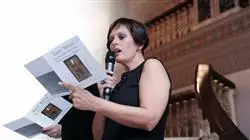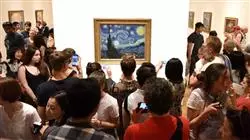University certificate
The world's largest faculty of journalism and communication”
Introduction to the Program
Do you want to dedicate yourself to cultural journalism? Or are you looking to create your own cultural information project? This Professional master’s degree provides you with all the knowledge you need"

The multiple digital platforms for accessing audiovisual content, podcasts, the proliferation of on-site and online festivals, artistic exhibitions and the multiple media in which to enjoy a good read have meant that culture now has countless doors open to reach the population. In this new scenario, cultural journalism also has different ways to reach an increasingly segmented audience and consumer of cultural content.
The press, radio and television continue to be the current media, which are committed to maintaining specific sections dedicated to culture, although it is true that the digital world has opened up infinite possibilities for journalists to be able to provide cultural information. This Professional master’s degree offers the graduate an intensive and advanced learning in this field, through a content in which the latest technology used in academic teaching has been applied.
Thus, through innovative teaching material, students will be able to delve into the current market of cultural journalism, interpretative genres, information in conventional media or cyberculture and digital journalism of cultural content. All this with a theoretical approach, but at the same time practical thanks to the contribution of the teaching team of real cases, which will allow the student to obtain a clearer and more direct vision of this journalistic specialization.
All this, in a 100% online educational format, where the graduate will be able to access the Professional master’s degree whenever and wherever they wish. You only need a computer, tablet or cell phone with internet connection to view the content of the syllabus. Without fixed class schedules, students have the freedom to distribute the teaching load according to their needs. It is, therefore, an ideal university program for people who wish to combine their professional and/or personal responsibilities with a qualification that places them at the academic forefront.
Update your knowledge in cultural journalism and become a relevant communicator in film, art and other cultural trends of the moment"
This Professional master’s degree in Cultural Journalism contains the most complete and up-to-date program on the market. Its most notable features are:
- Practical cases presented by experts in Cultural Journalism
- The graphic, schematic, and practical contents with which they are created, provide scientific and practical information on the disciplines that are essential for professional practice
- Practical exercises where the self-assessment process can be carried out to improve learning
- Its special emphasis on innovative methodologies
- Theoretical lessons, questions to the expert, debate forums on controversial topics, and individual reflection assignments
- Content that is accessible from any fixed or portable device with an Internet connection
Achieve a higher degree of professionalism in Cultural Journalism through the latest 100% online educational technology"
The program’s teaching staff includes professionals from the sector who contribute their work experience to this program, as well as renowned specialists from leading societies and prestigious universities.
The multimedia content, developed with the latest educational technology, will provide the professional with situated and contextual learning, i.e., a simulated environment that will provide immersive training programmed to train in real situations.
This program is designed around Problem-Based Learning, whereby the professional must try to solve the different professional practice situations that arise throughout the program. For this purpose, the student will be assisted by an innovative interactive video system created by renowned and experienced experts.
With this university program you will learn about the new social trends in Cultural Journalism"

Access whenever you want, from your computer, the latest content on Cultural Journalism. Enroll now"
Why study at TECH?
TECH is the world’s largest online university. With an impressive catalog of more than 14,000 university programs available in 11 languages, it is positioned as a leader in employability, with a 99% job placement rate. In addition, it relies on an enormous faculty of more than 6,000 professors of the highest international renown.

Study at the world's largest online university and guarantee your professional success. The future starts at TECH”
The world’s best online university according to FORBES
The prestigious Forbes magazine, specialized in business and finance, has highlighted TECH as “the world's best online university” This is what they have recently stated in an article in their digital edition in which they echo the success story of this institution, “thanks to the academic offer it provides, the selection of its teaching staff, and an innovative learning method aimed at educating the professionals of the future”
A revolutionary study method, a cutting-edge faculty and a practical focus: the key to TECH's success.
The most complete study plans on the university scene
TECH offers the most complete study plans on the university scene, with syllabuses that cover fundamental concepts and, at the same time, the main scientific advances in their specific scientific areas. In addition, these programs are continuously being updated to guarantee students the academic vanguard and the most in-demand professional skills. In this way, the university's qualifications provide its graduates with a significant advantage to propel their careers to success.
TECH offers the most comprehensive and intensive study plans on the current university scene.
A world-class teaching staff
TECH's teaching staff is made up of more than 6,000 professors with the highest international recognition. Professors, researchers and top executives of multinational companies, including Isaiah Covington, performance coach of the Boston Celtics; Magda Romanska, principal investigator at Harvard MetaLAB; Ignacio Wistumba, chairman of the department of translational molecular pathology at MD Anderson Cancer Center; and D.W. Pine, creative director of TIME magazine, among others.
Internationally renowned experts, specialized in different branches of Health, Technology, Communication and Business, form part of the TECH faculty.
A unique learning method
TECH is the first university to use Relearning in all its programs. It is the best online learning methodology, accredited with international teaching quality certifications, provided by prestigious educational agencies. In addition, this disruptive educational model is complemented with the “Case Method”, thereby setting up a unique online teaching strategy. Innovative teaching resources are also implemented, including detailed videos, infographics and interactive summaries.
TECH combines Relearning and the Case Method in all its university programs to guarantee excellent theoretical and practical learning, studying whenever and wherever you want.
The world's largest online university
TECH is the world’s largest online university. We are the largest educational institution, with the best and widest online educational catalog, one hundred percent online and covering the vast majority of areas of knowledge. We offer a large selection of our own degrees and accredited online undergraduate and postgraduate degrees. In total, more than 14,000 university degrees, in eleven different languages, make us the largest educational largest in the world.
TECH has the world's most extensive catalog of academic and official programs, available in more than 11 languages.
Google Premier Partner
The American technology giant has awarded TECH the Google Google Premier Partner badge. This award, which is only available to 3% of the world's companies, highlights the efficient, flexible and tailored experience that this university provides to students. The recognition as a Google Premier Partner not only accredits the maximum rigor, performance and investment in TECH's digital infrastructures, but also places this university as one of the world's leading technology companies.
Google has positioned TECH in the top 3% of the world's most important technology companies by awarding it its Google Premier Partner badge.
The official online university of the NBA
TECH is the official online university of the NBA. Thanks to our agreement with the biggest league in basketball, we offer our students exclusive university programs, as well as a wide variety of educational resources focused on the business of the league and other areas of the sports industry. Each program is made up of a uniquely designed syllabus and features exceptional guest hosts: professionals with a distinguished sports background who will offer their expertise on the most relevant topics.
TECH has been selected by the NBA, the world's top basketball league, as its official online university.
The top-rated university by its students
Students have positioned TECH as the world's top-rated university on the main review websites, with a highest rating of 4.9 out of 5, obtained from more than 1,000 reviews. These results consolidate TECH as the benchmark university institution at an international level, reflecting the excellence and positive impact of its educational model.” reflecting the excellence and positive impact of its educational model.”
TECH is the world’s top-rated university by its students.
Leaders in employability
TECH has managed to become the leading university in employability. 99% of its students obtain jobs in the academic field they have studied, within one year of completing any of the university's programs. A similar number achieve immediate career enhancement. All this thanks to a study methodology that bases its effectiveness on the acquisition of practical skills, which are absolutely necessary for professional development.
99% of TECH graduates find a job within a year of completing their studies.
Professional Master's Degree in Cultural Journalism
.
The emergence of new formats and communicative alternatives, added to the adaptation of models and forms of cultural expression to modern digital contexts, have led cultural journalism to a continuous process of development and evolution. Due to this situation, professionals specialized in the field find themselves in a scenario in which constant academic updating is a fundamental factor in the search to stay abreast of developments in the area and achieve optimal job performance in the sector. Understanding this fact, and with the intention of offering training alternatives of the highest quality, at TECH Global University we have designed our Professional Master's Degree in Cultural Journalism. In this Professional Master's Degree we will delve into the characteristics and particularities of the adaptation of opinion genres to the communicative trends of modern cultural journalism. Likewise, it will delve into the updating of the following aspects: knowledge of the main communicative and structural tools of cultural journalists in radio; and the important role of journalistic infographics in the development of communication processes of a cultural nature.
Study an online Professional Master's Degree in Cultural Journalism
.
The scenarios and contexts that accompany the modern development of cultural journalism highlight this sector as one of the most demanding areas with respect to the degree of knowledge, skills and abilities of its specialized professionals. In our Master's program, you will identify the main characteristics of the profile of the modern cultural journalist, contemplating his or her important role in the development processes of the sector. Likewise, this postgraduate program will place special emphasis on the modernization of the following topics: the identification of the main elements to be considered in the development of cultural information in the press, contemplating the most appropriate news genres for this format and their particularities at the editorial level; and the possibilities present in the evolution of audiovisual languages and the emergence of new communicative formats of cultural journalism.







